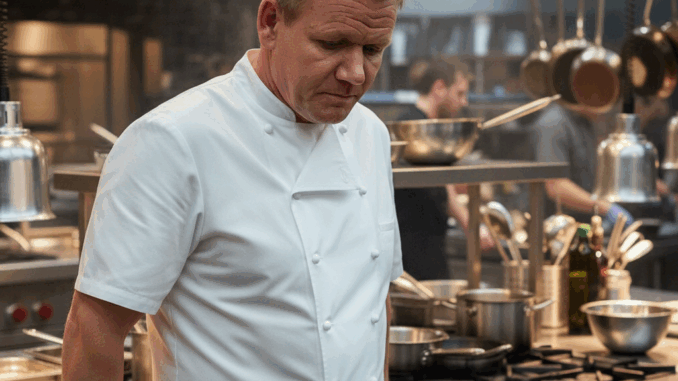
Gordon Ramsay’s Hell’s Kitchen has long been known for its fiery temper, high-stakes cooking challenges, and no-nonsense approach to reality television. But behind the drama and culinary spectacle, the show recently became embroiled in a legal scandal that has shocked fans and insiders alike. Sources reveal that a former contestant filed a lawsuit claiming that Ramsay publicly humiliated them during filming, an act broadcast live to millions of viewers, sparking widespread controversy.
According to insiders, the incident occurred during a particularly intense challenge where contestants were under extreme time pressure and scrutiny. The participant in question alleges that Ramsay singled them out for criticism in a way that went beyond professional guidance, using language and gestures that were deeply personal and demeaning. “It wasn’t just a critique of cooking skills,” a source familiar with the lawsuit explained. “The contestant claims it was public shaming, designed to embarrass them in front of both peers and the viewing audience.”
Legal experts note that reality TV shows operate in a unique space, balancing entertainment value with participants’ rights. In this case, the lawsuit reportedly cited emotional distress, reputational harm, and humiliation as the basis for the claim. “Shows like Hell’s Kitchen thrive on dramatic tension, but there are boundaries,” one legal analyst commented. “Contestants agree to participate knowing there will be pressure and criticism, but public shaming that causes emotional harm can cross legal lines.”
Fans and media outlets quickly picked up on the story, igniting debates over Ramsay’s signature style and the ethics of reality television. Social media erupted with conflicting opinions: some defended Ramsay, insisting that his tough approach is part of the show’s appeal and that contestants are aware of what they’re signing up for. Others expressed concern, suggesting that extreme public humiliation for entertainment value is unacceptable and could have serious consequences for the mental health of participants.
The lawsuit also highlighted the broader pressures faced by contestants on high-profile reality shows. Insider accounts reveal that participants often endure long hours, relentless competition, and constant scrutiny, both on camera and off. “Being on the show is grueling,” an insider said. “There’s immense pressure to perform perfectly while under the gaze of millions. For some, that pressure can be overwhelming, and in certain cases, crossing the line into public humiliation can leave lasting scars.”

NBC and the production team reportedly responded carefully to the allegations, emphasizing that the network takes participant welfare seriously and follows strict protocols. However, insiders hint that the lawsuit prompted internal reviews of on-set practices and staff training, aiming to prevent similar incidents in future seasons. “It forced a re-evaluation of how feedback is delivered,” the source explained. “Even high-intensity shows need to maintain ethical standards and ensure contestants are treated with respect, regardless of the drama required for television.”
The controversy also reignited discussions about Ramsay’s public persona. While fans admire his culinary expertise and commanding presence, critics argue that the extreme intensity and confrontational style showcased on Hell’s Kitchen can verge on bullying. The lawsuit has fueled questions about whether this approach is sustainable in today’s media climate, where audiences increasingly scrutinize the treatment of reality TV participants and demand accountability.
For the contestant involved, the lawsuit represents both a personal and public challenge, bringing attention to the potential human cost behind the entertainment spectacle. Observers suggest that cases like this may influence future reality TV productions, encouraging greater oversight, participant support, and mechanisms to protect individuals from extreme emotional distress while maintaining the high-stakes drama audiences expect.
As the legal proceedings continue, the incident has already left an indelible mark on the show’s reputation. Industry analysts predict that networks will closely watch the outcome, assessing the balance between drama, ethical responsibility, and legal risk. For viewers, the scandal offers a glimpse behind the curtain of a world many perceive as glamorous and exciting, revealing the pressures, vulnerabilities, and conflicts that occur when entertainment intersects with real human experience.
The Hell’s Kitchen lawsuit serves as a stark reminder: even the most celebrated television formats, and even the most confident celebrity chefs, are not immune to controversy when the line between tough love and public humiliation is crossed. Fans and industry insiders alike will be watching closely to see how the situation unfolds, and whether it prompts broader changes in the conduct of reality TV stars and productions in the years to come.
